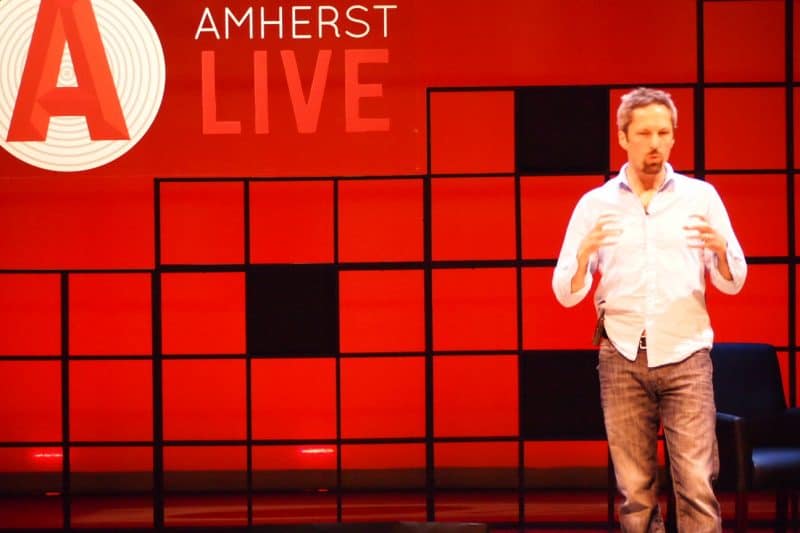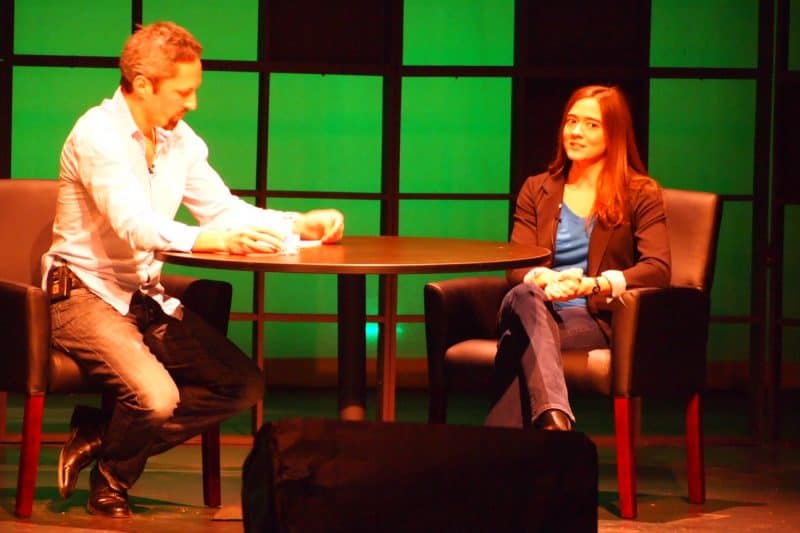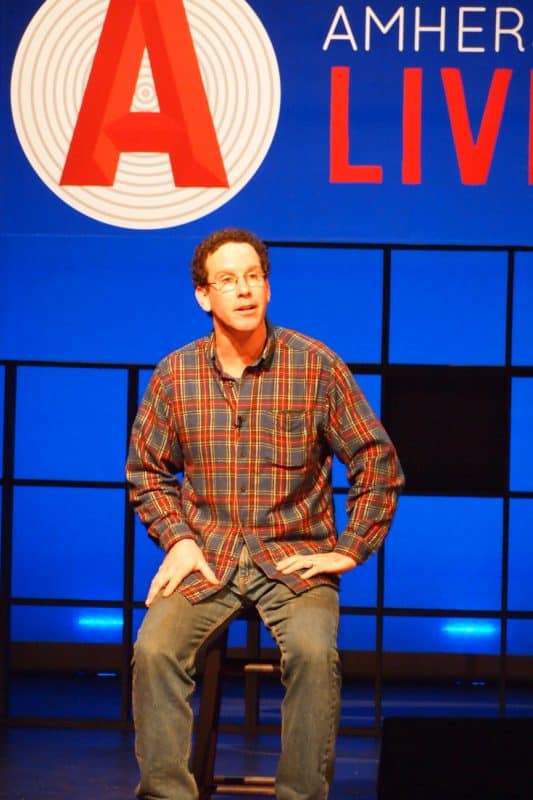Amherst LIVE Celebrates the Unique Vitality of a Special Town

Last night we bought our tickets on line to a sold-out show at the Kirby Theater at Amherst College for the second edition of Amherst LIVE, a magazine show about what it means to live in Amherst. The crowd was impressive–every seat was filled–and before the show, audience members mingled while quaffing brews made by High Horse Brewing on North Pleasant Street.
The capacity crowd for this second edition of the show says a lot about this town I once called home. Like the recent successful funding of Food for Thought Books, who raised nearly $40,000 from supporters, Amherst celebrates its uniqueness and its residents put their money where their mouths are. There was a crackle in the air, and an eagerness to hear was was to come.
The show was conceived by Oliver Broudy, who lives on Red Gate Lane. He opened the show with a monologue comparing a chance meeting with the developers of The Retreat in Town Hall to his own decision a few years ago to cut down a swath of large trees at his home. It was somewhat jarring to hear him laugh about how big the trees were that he cut down

yet I understood his comparison to the situation with The Retreat. In neither case was there anything that could stop it, yet he wanted his neighbor to know that he heard him, as the man attempted to raise objections to the tree felling, and then ran away from any confrontation.
Then we moved to a series of seated interviews with local luminaries–Casey Beebe, a naturalist from the Hitchcock Center explaining what woodland creatures do in deep winter, (some hibernate, some freeze their bodies, others dig tunnels in the snow). Then we heard from physicist Kathy Aidala of Mt Holyoke, who spoke about scientific research being done on local college campuses. The problem with these segments was that they went on too long and the pace dragged. I think starting out with the musical segment would have been a better choice.

The audience, however, seemed to love it all, and again, these are fascinating people doing good work in Amherst.
The segment I think was the most interesting came next, when Baer Tierkel, in a bow-tie and jacket, provided commentary as Oliver read suggestions from the audience about what would make Amherst a better town. Casting aside mean spirited suggestions like “let’s have a roast of Republicans” Broude read some interesting ideas that would indeed make the town better. A pop-up beer garden in Kendrick park? A town-gown bicycle race a la Breaking Away? Or how about breakfast in bed served to each resident on a street by the residents on neighboring streets? I would have loved to hear more of these as they were thoughtful and as Oliver said, there were selectboard and town meeting members in the audience, so they might get traction.
The show shifted gears when regional planning expert Lisa dePiano came out and gave a talk that would be very much at home as a TED presentation. She waxed nostalgically about growing up with immigrant parents in Philadelphia with extended family and no cars, and presented ideas about how to make neighborhoods more people friendly. She suggested ways we could change Amherst from being dominated by cars to become a haven for real community by taking back our streets.
Dan Kaplan presented a heartfelt answer to how he got into farming and started Brookfield Farm twenty years ago with memories of a dearly departed college friend . He spoke poignantly about his hazy, crazy days at Tufts and the desire he and his friends had to create a community. “The circle of life, from birth to death, the old forty acres and a mule, I see it every day on the farm.” He tied it all together with pauses and with the accompaniment of a sad guitar, explaining the creation of community and teaching the lessons of farming to apprentices who will carry it forward.
A three-song musical interlude by singer songwriter Dennis Crommett was a welcome break from the talks. I especially liked his description: “a gospel song by a white kid from UMass.” I think adding another singer, musician or another type of entertainer would have been a good was to balance out the show.
Two poets were represented by two readers and the poem by Lynne Francis called Pomegranate brought huge applause. It was a well-crafted poem about a daughter’s visit from New York City with a perfectly made pomegranate pie. It was evocative and indeed, a worthy winner.
Amherst LIVE brought together townspeople willing and eager to support making the town richer by sharing arts and culture, and Oliver Broudy should be proud both of how well the show was received and by the quality of the work. Any town with the kind of uniqueness found in Amherst deserves to celebrate it, and I am sure that there will be many more surprises ahead for fans of Amherst LIVE.
